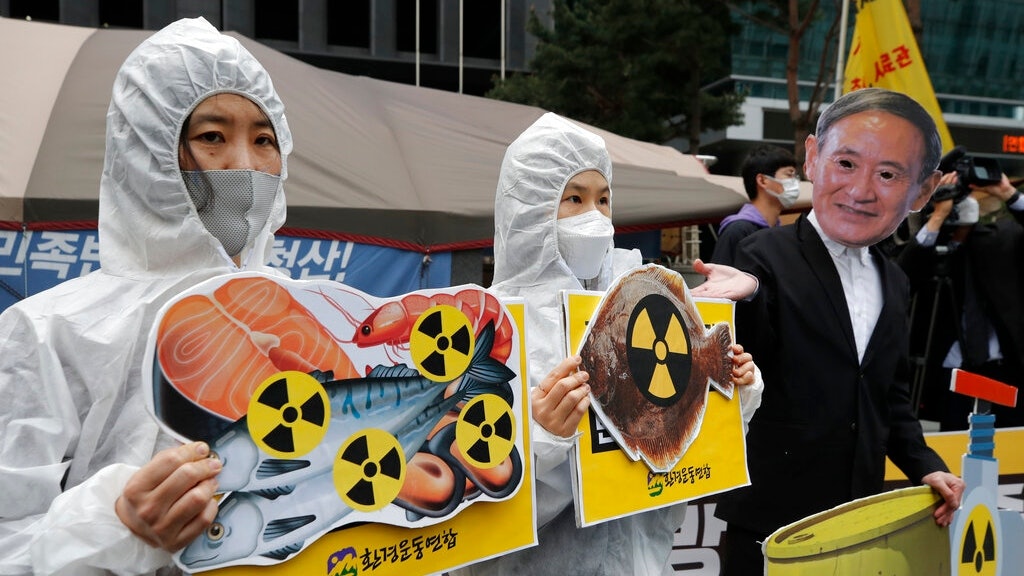Instant International
Written by: Xu Yi'an
2021-04-13 17:28
Last update date: 2021-04-13 17:28
Japan held a cabinet meeting on April 13 and officially decided to discharge the treated water from the Tokyo Electric Power Fukushima Daiichi Nuclear Power Plant into the sea two years later.
The treated water contains Tritium, a radioactive substance that cannot be removed technically. It will be discharged into the sea after being fully diluted, and the adjacent seas will be further contaminated.
Of course, the people who bear the brunt of the disaster are the people in the disaster area and the workers in fishing and agriculture.
Those who are striving to rebuild confidence in their products among consumers are afraid that rice, fruits and vegetables, and fish catches will further become targets for the outside world to avoid, including many neighboring countries.
Japan's nuclear disaster has caused ocean pollution, including China, South Korea, and Russia.
Greenpeace’s German office nuclear expert Shaun Burnie said on the 11th in the Global Times that it was previously believed that Cesium pollution in the East China Sea would not be as serious as the “March One” nuclear disaster, but Nanjing University in 2018 The model pointed out that the cesium that entered the Pacific Ocean in 2011 has flowed to the East China Sea in 2013 and reached its peak in 2019.
He said that many radioactive isotopes in seawater can cause damage to human and non-human genes.
He said that the Japanese method of treating sewage cannot remove tritium and carbon-14 (Carbon-14), as well as other substances such as strontium-90 (Strontium-90), iodine-129 (Iodine 129) and cobalt-16 (Cobalt-16).
If they exist in the environment for a long time, they will gradually enter the food chain.
Hong Kongers who are 2,998 kilometers away from Fukushima will of course be affected.
The picture shows an environmentalist in Seoul, South Korea, put on the mask of Japanese Prime Minister Yoshihide Suga on April 13, condemning the Japanese government's decision to discharge treated nuclear wastewater into the sea two years later.
(AP)
One of Hong Kong people's favorite delicacies
Dmitry Lisitsyn, head of the Sakhalin Environment Watch, an independent Russian environmental organization, told the Russian Satellite News Agency that Japan’s discharge of nuclear sewage from the Fukushima Daiichi Nuclear Power Plant may cause radioactive pollution to enter the Pacific Ocean where salmon is growing. Central North Pacific.
When radioactive contamination entered the Pacific Ocean near the coast of Honshu Island, it was quickly carried northeast by the Kuroshio and then entered the North Pacific Ocean Current.
All pollution is carried directly to the North Pacific.
What threat does this pose to Russia?
The fishes living in the North Pacific Ocean and then put on the table of the Russians have been polluted to a certain extent by the Fukushima nuclear power plant, and the pollution will become more serious with the sewage discharge, and this is the Pacific salmon first.
He pointed out that there are six species of Pacific salmon in the Far East. They lay their eggs in the rivers of the central North Pacific, which is exactly the polluted area.
Lisitsyn said the fish brought pollution here when they returned to the Russian coast.
To what extent fish will be polluted, it is difficult to say for the time being.
The picture shows the Fukushima First Nuclear Station in Japan under the lens on April 3, 2021.
On March 11, 2011, a ninth-magnitude earthquake occurred in the sea off Miyagi Prefecture, Japan. The huge tsunami caused the cores of three reactors in the nuclear power plant to melt down.
In addition to salmon, there are them...
According to the information on the website of China Geological Survey, compared with the Bohai Sea and the Yellow Sea, the East China Sea has higher water temperature and greater salinity, with a tidal range of 6 to 8 meters.
In addition, the East China Sea has a subtropical and temperate climate, which is conducive to the reproduction and growth of plankton. It is a good place for the reproduction and habitat of various fish and shrimp, and it is also the sea area with the highest marine productivity in China.
In the East China Sea, there is China's famous Zhoushan fishing ground, which is rich in large and small yellow croaker, cuttlefish, hairtail and so on.
Other places that produce seafood, including Taiwan, South Korea and North Korea, will also face the problem of increased seawater pollution. They are all deeply concerned about Japan's decision.
↓Hong Kong 01 reporter field interview:
【Visit Fukushima・1】Eight years after the disaster, agriculture hopes to get rid of negative rumors and regain confidence in food security
[Visit Fukushima, 2] The problems behind the bustling Soma fish market in the tsunami-stricken area need to be solved
[Visit Fukushima・Three] Iitate Village is unsealed for one year, and the new school building is waiting for the children to return
[Visit Fukushima・Pictures] The rebirth of Fukushima after the earthquake, tsunami, and nuclear disaster
Why does Fukushima accumulate nuclear waste water "super heavy hydrogen" tritium harmful to humans?
|News Classroom
International Atomic Energy Agency: Efforts should be made to avoid the harm caused by Fukushima nuclear wastewater
Japan decides to discharge Fukushima nuclear sewage into the sea, China, South Korea and the U.S. have different attitudes
The Japanese government officially decided to discharge nuclear sewage from the Fukushima Daiichi Nuclear Power Plant into the sea in two years
Fukushima nuclear disaster Japan nuclear power





/cloudfront-eu-central-1.images.arcpublishing.com/prisa/NIFZFFYBFVAU5FVWDHC43ESC5M.jpeg)

/cloudfront-eu-central-1.images.arcpublishing.com/prisa/BUA2NNBCCBACHEPXXR6NIRKCA4.jpg)






